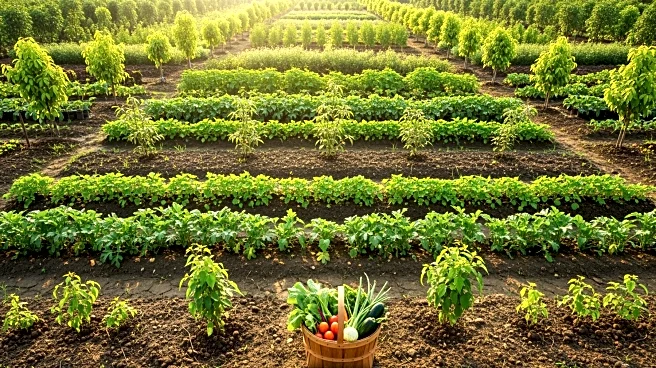What's Happening?
A study presented at the COP30 summit in Belém highlights the economic and environmental benefits of transitioning from livestock farming to plant-based agroforestry in Brazil. Coordinated by ProVeg Brazil,
the research suggests that such a shift could increase rural producers' net income by up to 110% per hectare, with potential increases of up to 1,525% in areas of low-productivity cattle farming. The study, conducted by the Agroecology Cooperative Organization (OCA), emphasizes that agroforestry systems can generate higher income with less environmental impact, as they absorb more carbon than they release. Additionally, agroforestry systems are more land-efficient, requiring 12 times less land than livestock farming to achieve the same revenue, thus offering a solution to deforestation.
Why It's Important?
The transition to plant-based agroforestry is significant for Brazil's economy and environmental goals. It presents a viable solution to reduce deforestation, which has been largely driven by the expansion of pastureland for cattle. By adopting agroforestry, Brazil can create more jobs, support family farming, and reduce rural migration. The study suggests that transforming even a small portion of degraded pastureland into agroforestry could help Brazil meet its national climate goals, contributing to more than 5% of the country's entire national mitigation target. This shift also aligns with global efforts to combat climate change and promote sustainable agricultural practices.
What's Next?
For wider adoption of plant-based agroforestry systems, the report calls for stronger policy support and increased funding for family farming initiatives. ProVeg Brazil advocates for agroforestry systems to be prioritized in national agricultural and climate policies. The financial sector is encouraged to restrict credit for livestock projects in deforested areas, redirecting financing toward sustainable practices. A pilot project in Paraná is currently testing the viability of this transition, with a family farmer replacing livestock with a plant-based agroforestry system. This project aims to demonstrate the economic and environmental benefits of agroforestry in practice.
Beyond the Headlines
The shift to agroforestry not only addresses economic and environmental concerns but also has cultural implications. It supports traditional family farming practices and helps preserve rural communities by providing diverse income sources. The transition could also influence global agricultural trends, encouraging other countries to adopt similar sustainable practices. Additionally, it highlights the role of policy and financial sectors in driving environmental change, emphasizing the need for collaborative efforts to achieve national and global climate goals.











